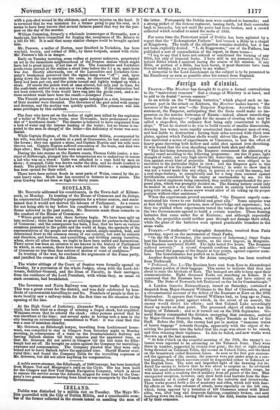SCOTLAND.
Mr. Bouverie addressed his constituents, in the Town-hall of Kilmar- nock, on Monday. In treating of the House of Commons and its doings, he controverted Lord Stanley's proposition for a winter session, and main- tained that it would not shorten the labours of Parliament. As a reason for not being able to lay before his constituents a list of important re- forms achieved in the past session, Mr. Bouverie made these remarks on the conduct of the House of Commons- " Where great parties end, there factions begin. We have been split up into sections ; there has been no great rallying-point for parties in the House of Commons; and the consequence has been, I fear, that we have on various occasions presented to the public and the world at large, the spectacle of the representatives of the people not showing a united, single-minded, bold, and determined front to the common enemy of our country, but rent by contests and disorders, and factions, and quarrelling, and dividing among ourselves, when, above all other times, we ought to have been united and harmonious. There never has been an occasion to me known in the history of Parliament in which, in one session, there have been placed on the table of the House of Commons no less than four notices of motion of want of confidence."
In treating of the war, he combated the arguments of the Peace party, and justified the course of the Allies.
The winter sittings of the Court of Session were formally opened on Tuesday, by a procession of the whole Judges, along with the Lord-Ad- vocate, Solicitor-General, and the Dean of Faculty, in their carriages, from the residence of the Lord President, with whom they, as usual on such occasions, had breakfasted.
The Inverness and Nairn Railway was opened for traffic last week. This was a great event for the district, and was duly celebrated by hun- dreds of excursionists travelling to and fro. Numbers of people in that re- mote locality saw a railway-train for the first time on the occasion of the opening of the line.
At the High Court of Justiciary, Alexander Watt, a respectable young clerk, has been tried on a charge of uttering a forged check, but acquitted. Witnesses swore that he uttered the check ; other persons proved that he was elsewhere at the time; and several spoke to having seen a man in the city bearing an extraordinary resemblance to Watt : it was clear that this was a case of mistaken identity.
Mr. Grierson, an Edinburgh lawyer, travelling from Lochlomond home- ward, was compelled to stay in Glasgow from Saturday night to Monday morning, in consequence of a train on the Dumbartonshire Railway not leaving Balloch station till forty minutes past the appointed time, so that Mr. Grierson did not arrive in Glasgow till the last train for Edin- burgh had set off. He brought an action against the Company for travelling- expenses and compensation. The Company pleaded that they were only bound not to leave Balloeh before the appointed time. Sheriff Hunter over- ruled this ; and found the Company liable for the travelling expenses of Mr. Grierson, but did not allow anything for compensation.
A noble screw-steamer, the Edinburgh, of 2400 tonnage, has been hunched from Messrs. Tod and Ilacgregor's yard on the Clyde. She has been built for the Glasgow and New York Steam Navigation Company, which is about to resume the service across the Atlantic, stopped for some time by the Com- pany's two great steamers having been hired as war-transports by the French Government.


































 Previous page
Previous page